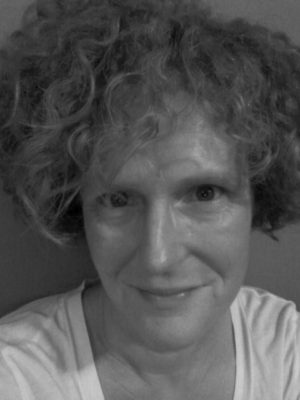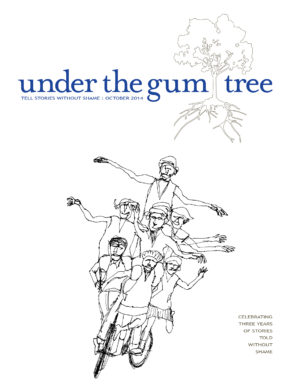Lesley Howard

Lesley Howard is a full-time mom and part-time freelance writer. She’s co-founded the New River Land Trust (a community land conservation) and New River Valley Voices (community of prose and poetry). Her story “After” in the current issue of Under the Gum Tree is her first piece of creative nonfiction and subsequently her first piece in a micro-magazine. It is concentrated around an emotional time in her life when she had recently announced her first pregnancy to her disbelieving grandmother and when she and her mother were dealing with admitting her grandmother to an Alzheimer’s unit. The piece is highly evocative for one so brief and gives a wonderful glimpse into the inner-workings of our many relationships.
Hear Lesley read her piece in the video of Under the Gum Tree’s three-year anniversary reading (Lesley is on at about the ten-minute mark).
When and why did you start writing?
I started writing in Kindergarten, on that paper with a pale blue dotted line indicating where the top of the “e” and the hump of the “h” should fall. I wrote stories to accompany my elaborate pictures of trees with rabbit families living in them (my understanding of the natural world notwithstanding, I believe this non-accurate rabbit habitat was an example of my early experimentation with creative nonfiction). These bunnies were always celebrating the current holiday. I drew teeny tiny hearts for Valentine’s Day, for example, under the beds, or in the oven.
What do you enjoy most about writing?
I love all the physical aspects of it: pen on paper for my discovery writing (I’m partial to rollerball cartridges in a thick-barrelled pen and Claire Fontaine 90 gram paper; yes, I am Picky Picky Picky). I love the sound of the keyboard when I type in my longhand drafts. I love the fine-line red pen I use to mark up my drafts. I love the printer’s whirr as it types out my edited drafts. I also love the writing process: I love discovery writing, when I don’t know what’s going to happen next. I love learning what I think while I write. I love plotting or developing an outline. I love looking creating a “word trap” (a technique I learned from Priscilla Long). I love rewriting my sentences, my paragraphs. I love finding synonyms in Roget’s.
How did you celebrate when you got your first acceptance?
I hollered “woo hoo!” and ran upstairs to our family room and did what I call the “happy dance” and what my teenage sons call the “mortifying excessive celebration dance.”
What inspired you to write this particular piece?
I was stuck with how to process my inheritance of journals—still am stuck, some days!—but I’ve found that writing about my experiences inside the parameters of a form loosens me up and reveals interesting facets of them, and myself. In this case, the form was based on the concept of repetition creating a powerful through-line for a short essay, and I modeled it on a short piece given to me in a workshop led by Priscilla Long. I’ve also found that creating “found poetry” from my mom’s journals is effective, as is using strict poetic forms.
What was the influence for the title?
NOTE: There was kerfufflement around the title! The piece’s title is AFTER, *not* “The Fall”! That said, the influence for the title was, perhaps too obviously, the repeated word, “after.” It’s a short piece; adding a “meaningful” title didn’t feel right.
The story certainly leaves readers with the itching question over what you found in your grandmother’s journals, were you satisfied in what you discovered?
Well, only insofar as I’ve been able to decipher them thus far. The “itch” was scratched, for me, through subsequent conversation with my mom and other family members after my Gram ultimately died. Conversations that I, at least, wouldn’t have known to even start, if not for the journals and my mom’s reaction to them.
Did what you read in journals account for any confusion you had as a child and grandchild growing up?
Some of it explained why things felt “off” in my family. But learning about how my parents were mistreated as children—and integrating my guesses about how that played out in their parenting, and how that’s carried down in my own parenting—has been a cyclical process for me. There are some moments where events of 30 years ago yield new insights.
During the timeframe of this story you were pregnant with what seems to be your first child. Can you take anything from the shared experience of this story with your grandmother and your own mother and apply it to being a parent for your child?
The experiences that triggered my writing of this piece have informed my choices around candid conversations with both my kids; things are what they are and pretending they ain’t—no good comes of that. I am, perhaps, too candid in front of them at times.
What has been your experience with writing before?
As noted in the answers to the first batch of questions, I started writing stories when I was about 5. I journal regularly, to clarify myself to myself, and I usually have a short story on a low boil. I was one of those kids who always had her nose in a book. That has remained true to this day—I love reading others’ writing.
What genres do you find yourself particularly drawn to?
I have always been drawn to fiction. Short stories, particularly, are satisfying to me. That said, now that I’m in the middle of my life, I find nonfiction that reflects on the experiences of aging, transition, parenting, elder-care, etc., to be just as compelling.
Who is your favorite author?
One?! Only one?! OK: Virginia Woolf.
Are you working on anything now?
I have a short story that I’ve been playing with for about a year, plus a couple of prose poems. But I don’t talk about specifics because then my energy for writing that particular piece diminishes.
Do you have any advice for other writers?
Craft can be learned! Talent is overrated, though helpful. Priscilla Long’s book, The Writer’s Portable Mentor, is the single best book on writing I’ve seen. My copy is dog-eared, flagged, underlined, and marginalia-ed to within an inch of its life. But bottom line: you gotta put your butt in the chair and keep it there long enough to do the work. TURN OFF YOUR INTERNET.




